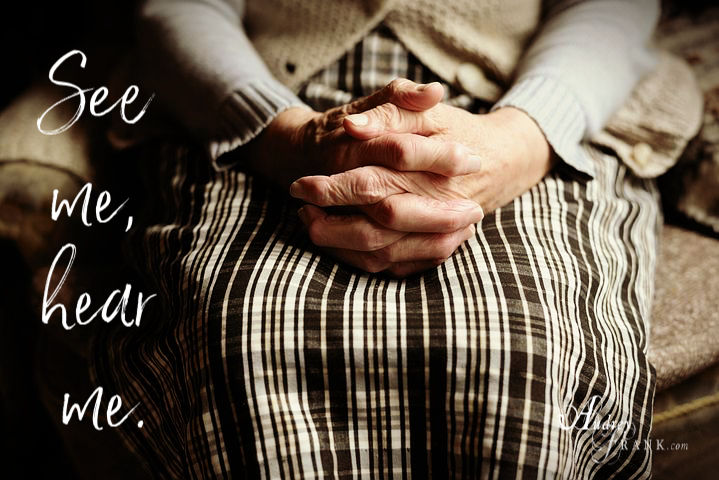You Never Know What Someone Else is Going Through

Understand this, my dear brothers and sisters! Let every person be quick to listen, slow to speak, slow to anger (James 1:19, NET).
“You never know what someone else is going through” sounds like a mother’s well-worn admonition to her children. I know I say it often to mine, and the words ring true if we stop a moment to think about it. In our fast-paced, busy culture, we race past one another, forming immediate judgments without pausing to truly understand one another.
Before you judge a man, walk a mile in his shoes.
Things aren’t always as they seem.
Don’t judge a book by its cover.
The English language is brimming with idioms which caution against hasty judgment. Yet, again and again, we trample one another with our quick wit, astute observations, and lofty opinions. Social media too often serves as a megaphone for snap-judgment and the ruination of already-hurting people’s lives instead of a medium for encouragement and understanding.
Judging before seeking to understand is one #habit we would do well to break. #peacemaker Click To TweetIn his book, The 7 Habits of Highly Effective People, Stephen R. Covey tells the story of how he learned that you never know what someone else is going through. He was riding on a subway one day when the calm and quiet of the car was disrupted by the entrance of a man and his two children. The children were rambunctious. Running around, shouting and throwing papers at other passengers, they created chaos. All the while their father sat with his eyes closed, oblivious to their behavior.
Feeling irritated, Stephen finally turned to him.
“’Sir, your children are really disturbing a lot of people. I wonder if you could control them a little more?”
The man lifted his gaze as if to come to a consciousness of the situation for the first time and said softly, “Oh, you’re right. I guess I should do something about it. We just came from the hospital where their mother died about an hour ago. I don’t know what to think, and I guess they don’t know how to handle it either.’”
You can read more about what Stephen learned from this in Part One of The 7 Habits, in the section titled, The Power of a Paradigm Shift.
Stephen was mortified at the prior assumption he’d so confidently made about the silent man on the bus and his misbehaving children. His perspective shifted permanently that day.
Before we judge another person, march in with our advice, assail them with help it is obvious to us they need, we should stop to consider: you never know what someone else may be going through.
Most of us do not discover how desperate life can seem, how deep the pain can be, how hard one can try and things still go wrong, until suffering hits home. Under its terrible weight, we remember others who we were vaguely aware of suffered at one time, but we were too busy, too focused on our own point of view, to come alongside and help.
For whatever reason, we could not see them, nevertheless listen to them.
As I stayed shut up in my room for ten days after the loss of our unborn daughter in 2007, I thought with shame how little I had understood friends who had suffered a similar loss.
Life can be painful, and we need to learn to see and listen to each other.
We need one another. But what we do not need from one another is hasty help that does not stop to look and listen first.
Jesus was masterful at stopping, looking, and listening. I can hear you thinking now, “But He was God! He had an advantage!”
You and I were made in God’s image. We can be like Christ. We become like those with whom we spend quality and quantity time. Spending time with Jesus in prayer and reading the Bible forms His likeness in us. We become more gentle, more patient. We slow down to listen and see others before reacting in judgment or anger.
Jesus understood what was in the heart of every person He met, and He knew what they were going through. The first step in considering what another person is going through is prayer. Pray and ask God to help you understand.
I speak to many people in my travels. Time and time again a stranger sits before me after a talk I have given and begins to open her heart. We may never have met before, but God knows her heart and exactly what she is going through. He helps me see and listen, and He will help you, too.
Seeing and listening to others has changed me. I can see and appreciate viewpoints and challenges different from my own. I can feel deep compassion and mercy for those who suffer in ways I have not. I can have grace for those who do not understand my suffering because their journey has been different from my own.
You never know what someone else is going through until you stop to see them and listen to them. #compassion #peacemaker Click To TweetThe next time you rush to a conclusion, stop in mid-stride and ask God to help you see what else might be going on.
With God’s help, we can be peacemakers and grace-givers in a broken, judging world.
Lord, slow me down. Open my eyes to see others and listen to them. Make me your instrument of peace and grace in the lives of those I meet. Amen.

No Comments